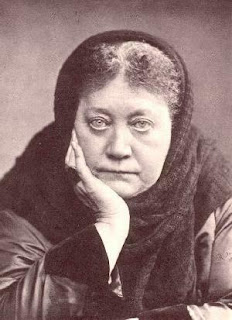Expressive individual, wasn't she ?!?
For those unaware, H.P. Blavatsky, Madame Blavatsky or simply, Blavatsky, was one of the more intriguing figures who surfaced in the nineteenth century. To many her name remains unknown yet she had an influence on various creative minds and thinkers in the day. Pious and divine matter was starting to be explained, through scientific means and no longer relegated to being dismissed as heresy. This age of enlightenment started in the eighteenth century, populated with discoveries and theories by the likes of Newton and Ashmole; the invention of the steam engine and an Industrial revolution had swept across Europe; there was reasoning by the likes of Kant and Rousseau; and by 1850 there were two new planets in our Solar System. After centuries of veneration of the sacred and the profane, and suppression of scientific reasoning by the Church in the name of faith; scientific reason was starting to take its foothold once again through logic and discovery. Religion was still important in people's lives, although to condemn its ideas and doctrines was no longer punishable by death. For those who 'thought', and extolled unorthodox ideas which contradicted the Bible, excommunication posed no threat nor fear. the western mind was re-opened; However, out of this time where the significance and fear inspired through religion and devotion was on the wane; soon thereafter, a new form of superstition would surface in the Victorian mind with the birth of spiritualism, including a belief in ghosts to haunt rather than to forewarn and guide. This period was to encourage an opening of the mind to Eastern ideas, and inspired the birth of Theosophy.
Helena Petrovna Blavatsky, her teachings and her ideology ('The Secret Doctrine') which fall under the collective aegis of Theosophy, have long had champions as well as detractors. Blavatsky herself was born of noble blood in 1831 in southern Russia, the daughter of a Russian colonel and an established novelist. Her biographies were to claim she was exceptional, but unusual child, possessing psychic powers and an inquisitive nature, the young Helena Petrovna Gan, apparently possessed psychic and spiritual abilities. Following her short-lived marriage at a young age to Nikifor Blavatsky, vice chancellor of Erevan, the young Helena Blavatsky abandoned her husband and left Russia and decided to travel, discovering Turkey, Greece and Egypt.
After encountering a guru figure or 'Teacher' in London, Blavatsky was to travel further afield and into India, Tibet, and later across the ocean to South America. Following this exposure to different cultures, beliefs and ideas and under the guidance of the Mahatma Morya, she and two others set up the Theosophical Society. Blavatsky defined Theosophy as being "the archaic Wisdom-Religion, the esoteric doctrine once known in every ancient country having claims upon civilization." She later was to write the findings of her years of research in The Secret Doctrine, as well as other works such as The Key to Theosophy, and Isis Unveiled. Theosophy itself was to attract various followers (as well as skeptics) over the years. Among the more celebrated of its believers were "AE" Russell, Leo Tolstoy, and George Mead (both of whom were acquainted and knew Blavatsky), and Rudolf Steiner.




No comments:
Post a Comment